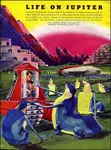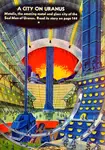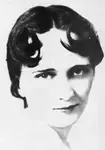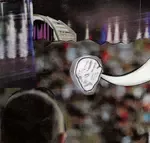- Home
- Planet X
planet x
[ + links to: Mission to the Tenth Planet - What to see on Planet X ]
The fictional Old Solar System shares most of its worlds with the factual Real Solar System - but one major exception lurks at each end. These two scientifically un-listed but literarily weighty worlds book-ending the System are: the infra-Mercurian Vulcan, and the trans-Plutonian Planet X.
Both have become stalwart settings for tales, which is good for us as readers, but poses a problem for us as critics. The very success of such scenarios imposes on us the task of explaining how these wholly imaginary worlds can have accreted their personalities without any of that physical actuality which normally acts as literary catalyst -
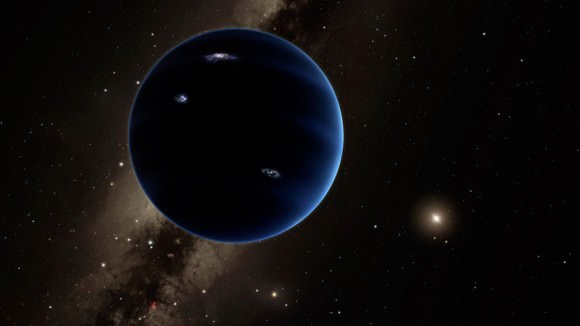
Stid: Bunkum! There's really no problem at all. The history of science is full of mistakes and unknowns, so why shouldn't science-fictional catalysts originate in one of these mistakes (Vulcan) or unknowns (Planet X)?
Zendexor: All the same, I think it's worth complimenting these figments of the human imagination on their corporeal success -
Stid: Paper-and-ink corporeal, that's all...
Harlei: Hey, not for long, maybe! I bet I'll live to see the real Planet X discovered!
Zendexor: And if and when that happens, the new-found planet will find its fictional garb ready and waiting for it to put on.
Stid: The garments won't match the reality, that's for sure; but that won't worry you, Zendexor.
Zendexor: The one necessary match-up will be that of position. A trans-Plutonian planet is a trans-Plutonian planet; its RSS and OSS natures will spring from that identity - of being on the rim, the edge.
And though the streams of fact and fiction must thence diverge, they still pull at each other as if linked by an invisible elastic band. We can trace this pull already, even before the discovery of Planet X has been announced, and even if it never is announced. You're looking puzzled, Stid. I'm talking about creative tension here. The tension between the cold dead Planet X and the life-bearing weird Planet X. This isn't just RSS versus OSS. Both strands exist in the OSS version. They have to; it's inevitable.
a wraith of a theme
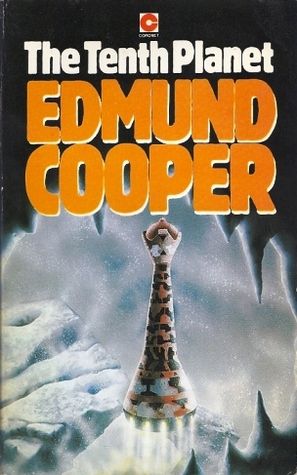
Let's start with the most realistic, i.e. the most bleak and lifeless, version of Planet X. In The Tenth Planet we find that the outermost world - here named Minerva - has been used for thousands of years as a lone colony of refugees living underground. Its one perceived merit seems to be its distance from the inner solar system. Minerva is otherwise (supposedly) uninteresting. And yet -
When one of its inhabitants becomes himself a refugee from the refugees, and decides to flee up towards the inhospitable, deadly surface, I find myself wishing, hoping, yearning to see that barren landscape.
...The five atomic lamps, each on top of a pylon three hundred metres high close to a city tower, shone brilliantly like fixed miniature suns.
Idris smiled to himself and peered rapturously through his visor at the bleak glory of the surface of the tenth planet.
Hans Andersen, he thought. The Ice Queen's Palace. Complete with diamonds as big as the Ritz...
Only the diamonds were not crystalline carbon. They were crystalline forms of oxygen and nitrogen...
Most of The Tenth Planet is not really concerned with the tenth planet for its own sake, only with its artificial subterranean culture. It's quite a page-turner - Edmund Cooper knows how to tell a story - but my point is, the slight tincture of real planetary character which we get from a few passages in the finale give an extra thrill out of all proportion to the actual role of those scenes in the plot. In a few phrases about "diamonds" of frozen gas, about razor-sharp rocks and dustings of hydrogen snow, the author lets in something bigger than the scheme of his book, something beyond his purpose.
What has happened? The Planet X Archetype has stepped in. It has added the merest drop of its strength to the tale, and stirred the mixture to give it an extra special tang.
Harlei: But next, let's think, if such a little sip of Strong Archetype liqueur goes such a long way, a big dose will go an even further way! So how about if we turn to a story which actually does concern itself with Planet X for its own sake?
dark, cold and alive
Zendexor: All right, let's consider a story which does what you want, Harlei. One in which Planet X is the main point and not a mere convenience for purposes of isolation... while nevertheless retaining the theme of a bleak, hostile environment.
It's called, simply, The Tenth World.
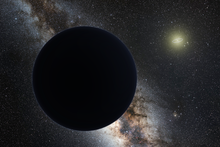
"..look; this planet's about 15,000 miles in diameter, I believe. We're headed now for the equatorial, the hot zone. It must be all of 5 degrees above absolute zero there..."
The explorers, who tackle their adventures with the happy-go-lucky drive of clever schoolboys, remind us what discovery is: not a business of looking at remotely-sensed images, but actually getting out there, seeing a new world with your own eyes, daring to tread its surface... You see from the above, the reader is given a "ringside seat" at the discovery. And the scenario unfolds: giving us, first, a landscape:
...Blake rounded the hull of the ship, resting on a smooth patch of sparse, blue sand over black, angular pebbles. There was an end to the plain here. The lake nestled almost at the foot of an immense, chalky cliff that towered into starlit dimness overhead. Off to the north, and vanished, heading, as they knew, to a greater river, part of a yet greater one that emptied finally into a huge, inland sea.
Around the curve of the ship, from the peak of a chalky cliff, a stream of liquid was arching downward, spraying, breaking into flying droplets in the thin air of the frozen world, an air consisting only of helium, and the vapors of this liquid - hydrogen. Nearly a thousand feet it hurled itself down, to smash in glittering foam on broken debris fallen from the huge cliff.
Off to the right, a vein of dark rock shot up at an angle through the cliff, and broke off sharply. A thinner vein of a gray stone lay beneath it. Near the base of the cliff in that direction, the tumbled debris lay on the bluish, sandy beach, jumbled, rounded rock, jet black in the light of a five-and-three-quarters-billion-mile-distant sun.
The great cliff stretched off, off to the right for unending distances, lost in the dimness that shrouded forever the far reaches of this dead world...
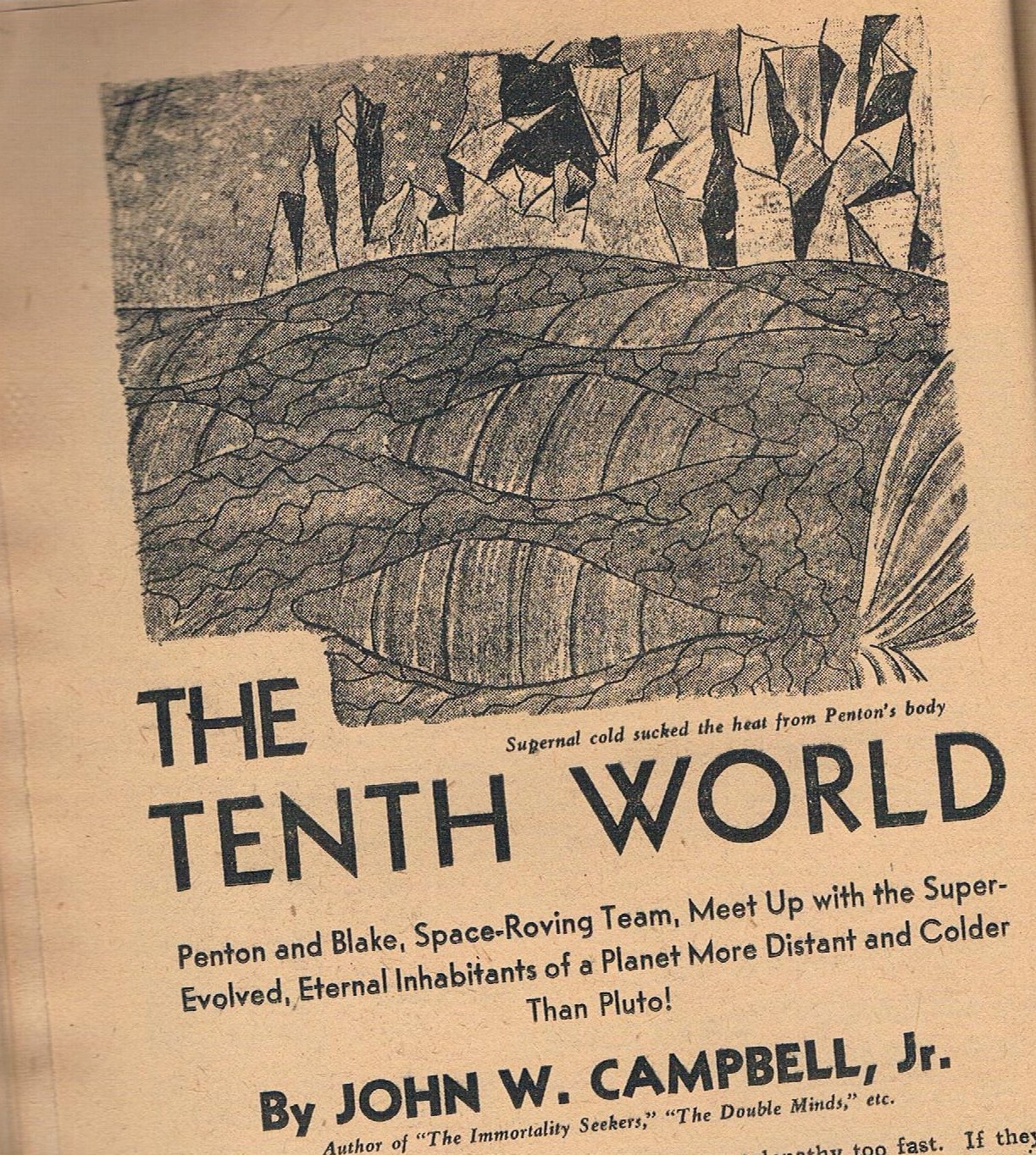
Stid: And then the overgrown schoolboys, Penton and Blake, discover that it isn't a dead world after all...
Zendexor: You and I would both prefer them to have been more mature, reflective explorers. Yet for all its stylistic faults I consider this to be the best of the Penton and Blake stories (I deal with it more fully in Life and Death on The Tenth World, a section on the page which I have devoted to that pair of characters). Who knows, maybe you and I would have reacted no differently from the "overgrown schoolboys", as you call them, when the truth hits.
...Penton looked closely toward one of the ten-foot, irregularly rounded boulders. Very, very slowly it was changing its shape. A dozen near it were changing shape. As they changed, they rolled slowly, irregularly toward the dying glow in the rocky cliff face.
"Great guns!" gasped Penton. "They - they're alive!"
Blake yelled and jumped clumsily under the heavier gravity. Penton turned with leveled proton gun, then lowered it slowly. Blake was heading rapidly toward a narrow, deep crevice in the wall of the cliff, a fault between two immense masses of the solid, black rock. Behind him, rolling very slowly over the spot where he had stood, a ten-foot "boulder" stopped indecisively, changed shape slowly, flattening into stability.
"If you must yell, Rod," said Penton sharply, "disconnect your transceiver first. They can't move fast enough to catch anything, so come out of hiding."
Blake came out of the deep crevice sheepishly. "It startled me, damn it..."
Next, though, some markedly different creatures appear on the scene and we're introduced to a far swifter, more formidable kind of life. And more than mere life - intelligence. And as the scope of the tale widens further we find that it portrays a tragic intelligence, stuck in a unique evolutionary trap which matches nothing else I've come across in sf literature...
I'd better stop there. Because the denouement is too good to spoil, I don't want to say anything more about The Tenth World.
Harlei: You're making it out to be a hard act to follow. What sort of Planet X can you cap it with?
Zendexor: Somewhere warmer!
Stid: Warmth, eh? The trade-offs loom at this point. An author may wish to make Planet X humanly warm, but he or she can't simply declare that it's warm. You have to give at least a perfunctorily plausible reason. Even the OSS demands some realism! Either the world has to be so big that it heats itself with its own gravitational contraction - in which case the gravity would crush creatures like us - or else you have to go for the artificial stuff; heated domes, underground warrens...
enjoying warmth while one can
Zendexor: Or a hollow world, a sort of Pellucidar of the outer System.
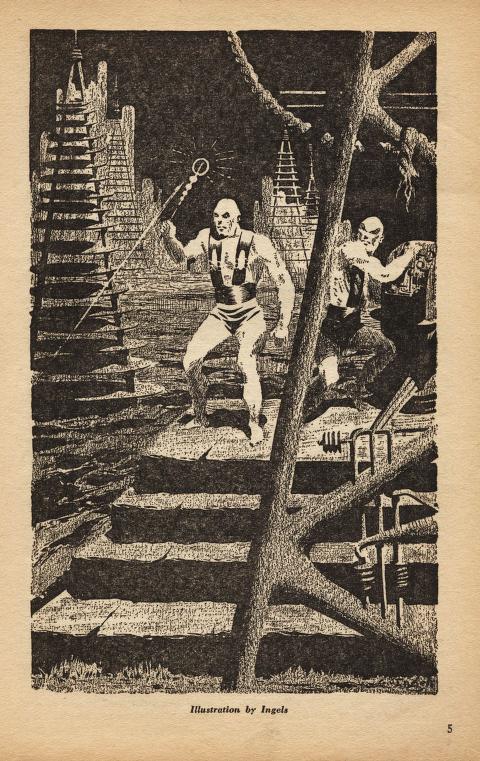
That
option would give scope for millions of square miles of warm, habitable
land. Admittedly, ideally, the true nature of a planetary archetype
ought to be expressed openly on its outer surface, not evasively
underground; and the separation from the ideal seems all the worse if
the hollowness is artificial, rather than a genuine, Pellucidar-type
phenomenon - but you can't have everything. Hence the "trade-off" you mentioned, Stid - for I take it you thereby refer to the tussle between the practical needs of the human plot (heat, light, ecosystem) and the personality-requirements of Planet X (the soul of frontierdom, the utter edge).
Harlei: You need to have it both ways, really, for the story to work as an embodiment of Planet X. You need the scope given by warmth, and the sense of Outer-ness given by some insecurity in that warmth.
Zendexor: Quite! Envisage a hollow-world scene that has become largely "naturalized" over the ages... so that the natives think of it as normal, as the only world... and then hint to the reader that the arrangement may be about to break down...
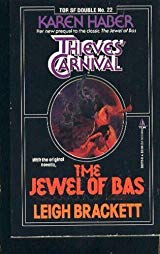
"Kiri - Kiri, look!"
He jerked his head back, angry and startled. Then the anger faded.
There was a different quality to the light. The warm, friendly, reddish sunlight that never dimmed or faded.
There was a shadow spreading out in the sky over Ben Beatha. It grew and widened, and the sunballs went out, one by one, and darkness came toward them over the Forbidden Plains.
They crouched, clinging together, not speaking, not breathing. An uneasy breeze sighed over them, moving out. Then, after a long time, the sunballs sparkled and burned again, and the shadow was gone.
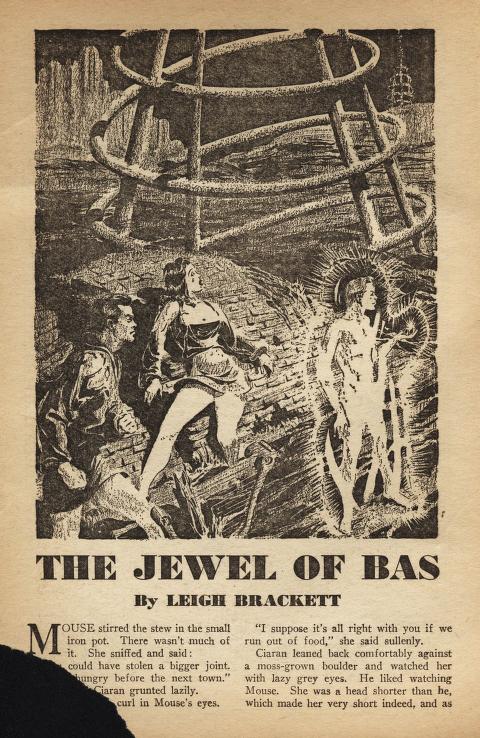
Ciaran dragged down an unsteady breath. He was sweating, but where his hands and Mouse's touched, locked together, they were cold as death.
"What was it, Kiri?"
"I don't know." He got up, slinging the harp across his back without thinking about it. He felt naked suddenly, up there on the high ridge. Stripped and unsafe. He pulled Mouse to her feet. Neither of them spoke again. Their eyes had a queer stunned look...
This picaresque couple have no idea, yet, that they are living on the inner surface of the Tenth Planet; or that their habitable environment is an artificial creation of an immortal Atlantean fugitive from Earth (though the reader will appreciate the dramatic irony of the name given to the "Plains of Atlantea" in this hollow world). But, crisis will teach the truth to Ciaran. And by the end of The Jewel of Bas the reader has been allowed to have it both ways: to appreciate the warm world which Ciaran and Mouse call their own, and to appreciate, by contrast, that it is also immensely far from, and different from, the world we know.
Harlei: So then, Zendexor, you regard The Jewel of Bas as a worthy Tenth-Planet tale, despite its warmth and colour?
Zendexor: Yes, it squares that circle by means of a special, haunting remoteness. That quality acts like a successful substitute for the emphasis on cold which animates other versions of Planet X.
Stid: "Animates"? A paradoxical choice of term, Zendexor, when applied to extreme and deadening cold. But no doubt you chose the word deliberately.
Zendexor: I did, yes, for I'm now about to veer back to the freeze-scenario, the cryogenic Planet X, to attain the acme of that life-in-death paradox.
escape to the flame disk
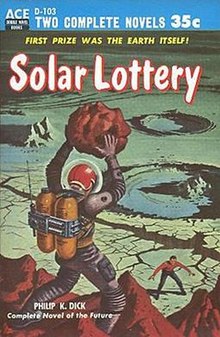
Cartwright rattled his scrap of crumpled metalfoil. "Well, this is it. Anybody have any doubts? Anybody want to back out?"
There was excitement and tension, but none of them stirred. Mary Uzich smiled at Cartwright and then up at the young man beside her; Konklin put his arm around her and pulled her close.
"This is what we've worked for," Cartwright continued. "This is the moment our money and time have gone to. I wish John Preston were here; he'd be glad to see this. He knew it would come, some day. He knew there'd be a ship heading out past the colony planets, beyond the regions controlled by the Directorate. In his heart he was certain that men would seek new frontiers... and freedom." He examined his watch. "Good-bye and good luck - you're on your way. Keep tight hold of your charms and let Groves do the steering."
One by one they gathered their meager possessions and shuffled out of the room. Cartwright shook hands with them, mumbled words of hope and comfort. When the last of them had gone he stood for a moment, silent and thoughtful, in the now deserted room.
"I'm glad that's over," Rita declared, relaxing. "I was afraid some of them would back out."
"The unknown is a terrible place. There are monsters out there. And in one of his books Preston describes weird calling voices." Cartwright poured himself a cup of black coffee from the silex. "Well, we have our part here. I don't know which is worse."
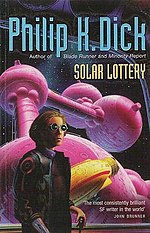
Solar Lottery is a fast-paced dystopian adventure set mostly on Earth in the year 2203, in a sick culture dominated by industrial feudatories and obsessed by a game of chance. Power lies with whomever wins a global lottery, provided that the winner then avoids losing the Assassination Game...
One sympathetic character, Leon Cartwright, fortunately manages to gain power by manipulating the games machine.
A follower of the crank John Preston, who died in obscurity, Cartwright then uses his influence to protect the would-be emigrant misfits of the Preston Society, in their attempt to escape Earth's hellish culture in a space-ship and go looking for the "Flame Disk" - namely, Planet X.
Stid: Why? I mean, why did Preston pick on the Flame Disk for his obsession? I never could figure it out.
Zendexor: It has occurred to me that some day I might re-read Solar Lottery yet again but, for once, not primarily for pleasure - instead, I'd read it in the spirit of one who searches for clues. To figure it out, as you say.
But you know what - I don't think I ever will.
You see, I like it just as it is. I like the creaky, cranky notion of this battered space-ship of emigrants, fleeing to the outer edge of the System in search of a world which means freedom to them, in some sense which defies logic. And the climax - well, to illustrate that it's plenty good, I'll just say that I have read the book umpteen times.
I don't even ask myself all the normal questions: is there life on that world, how can the emigrants expect to live there, and so on. I'm left only with a haunting sense of its weird glowing-mineral light, and the recorded voice that seems more alive and real than a "live" voice could possibly be. It's like Hari Seldon in the Time-Vault. It's the speaking mouth of history. It's the voice of John Preston addressing his followers.
To quote T S Eliot:
the communication
Of the dead is tongued with fire beyond the language of the living.
Leigh Brackett, "The Jewel of Bas" (Planet Stories, Spring 1944); John W Campbell, "The Tenth World" (Thrilling Wonder Stories, December 1937); Edmund Cooper, The Tenth Planet (1973); Philip K Dick, Solar Lottery (1955)
See also For an unwritten tale of Planet X.
For a lonely but not particularly cold transplutonian world, see A planet named Chaos. For doubts about its status see Making room for Chaos.
For Proserpine according to James Blish see The smallest gas-giant.



























